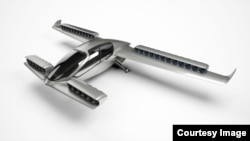A Bavarian startup is developing a five-seat "flying taxi" after successful test flights over Germany of a smaller version of the electric jet, the company said Thursday.
Munich-based Lilium, backed by investors who include Skype co-founder Niklas Zennstrom, said the planned five-seater jet, which will be capable of vertical takeoff and landing, could be used for urban air taxi and ride-sharing services.
In flight tests, a two-seat prototype executed maneuvers that included a midair transition from hover mode, like a drone, to wing-borne flight, like a conventional aircraft, Lilium said.
Potential competitors to Lilium Jet include much bigger players such as Airbus, the maker of commercial airliners and helicopters, which aims to test a prototype self-piloted, single-seat "flying car" later in 2017.
Slovakian firm to take orders
Slovakian firm AeroMobil said at a car show in Monaco on Thursday that it would start taking pre-orders for a hybrid flying car that can drive on roads. It said it planned production beginning in 2020.
But makers of "flying cars" still face hurdles, including convincing regulators and the public that their products can be used safely. Governments are still grappling with regulations for drones and driverless cars.
Lilium said its jet, with a range of 300 kilometers (190 miles) and cruising speed of 300 kph (185 mph), is the only electric aircraft capable of both vertical takeoff and jet-powered flight.
"We have solved some of the toughest engineering challenges in aviation to get to this point," Daniel Wiegand, Lilium co-founder and chief executive, said in a statement.
The jet, whose power consumption per kilometer is comparable to that of an electric car, could offer passenger flights at prices comparable to those of normal taxis but with speeds five times faster, Lilium said.
Lilium, founded in 2014 by four graduates from the Technical University of Munich, is unusual on the German startup scene, which is dominated by e-commerce firms largely based in Berlin and self-financed engineering firms dotted around the country.
It raised $11.4 million (10.6 million euros) in 2016 from Zennstrom-led venture firm Atomico Partners and e42, the investment arm of entrepreneur Frank Thelen, a juror on the German investment reality TV show "Lion's Den."
Two-seat 'multicopter'
Other potential rivals include crowd-funded eVolo, a firm based near Mannheim that has said it expects to receive special regulatory approval for its two-seat "multicopter" with 18 rotors to be used as flying taxis in pilot projects by 2018.
Terrafugia, based outside the U.S. city of Boston and founded a decade ago by Massachusetts Institute of Technology graduates, aims to build a mass-market flying car, while U.S.-Israeli firm Joby Aviation has said it is working on a four-seater drone.
Google, Tesla and Uber have also reportedly shown interest in the new technology.











